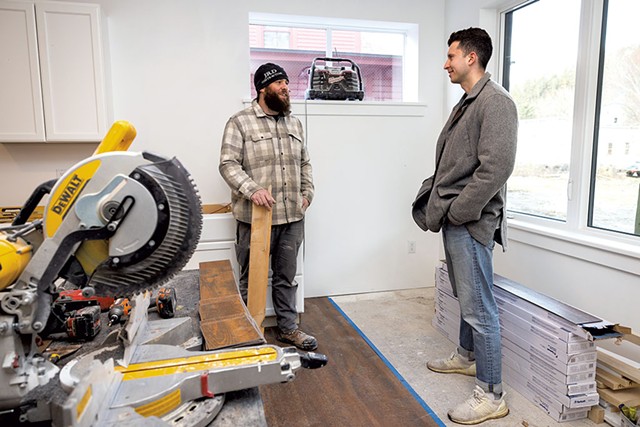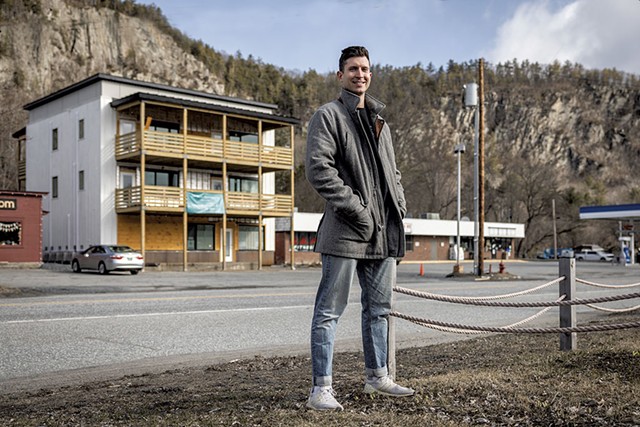Switch to the mobile version of this page.
Vermont's Independent Voice
- News
- Arts+Culture
- Home+Design
- Food
- Cannabis
- Music
- On Screen
- Events
- Jobs
- Obituaries
- Classifieds
- Personals
Browse News
Departments
Browse Arts + Culture
View All
local resources
Browse Food + Drink
View All
Browse Cannabis
View All
-
Culture

'Cannasations' Podcaster Kris Brown Aims to 'Humanize'…
-
True 802

A Burlington Cannabis Shop Plans to Host…
-
Business

Judge Tosses Burlington Cannabiz Owner's Lawsuit
-
Health + Fitness

Vermont's Cannabis Nurse Hotline Answers Health Questions…
-
Business

Waterbury Couple Buy Rare Vermont Cannabis License
Browse Music
View All
Browse On Screen
Browse Events
Browse Classifieds
Browse Personals
-

If you're looking for "I Spys," dating or LTRs, this is your scene.
View Profiles
Special Reports
Pubs+More
Fairlee Developer Wants to Help Others Tackle Small-Town Housing Roadblocks
Published April 5, 2023 at 10:00 a.m.
Developer Jonah Richard is putting the finishing touches on an eight-unit apartment project in Fairlee, and he's starting another one in Bradford this spring. He hopes to take what he's learned to help other builders fill in a missing piece of the real estate puzzle: small developments in rural Vermont.
Richard is general contractor on his project, working with a four-man crew, including a master carpenter whom he's paying $50 an hour. He has set out to learn under their tutelage.
"I can't think of a faster way to acclimate to the industry," the sawdust-speckled Richard said recently as saws screeched inside the apartment building at 501 Main Street.
A small-scale village development that's almost ready for tenants is a rare commodity in Vermont. And it's the kind of rural private housing that leaders all over Vermont are trying to encourage.
Chris Brimmer, Fairlee's zoning administrator, sees Richard as a pioneer.
"This is the end of a decades-long effort to get multifamily housing in town," he said, noting that the downtown has plenty of open spaces to build and the water system and schools have unused capacity. "We're hoping it breaks the logjam."
Richard and his partners — three cousins and a family friend — have also purchased a vacant lot across the street from the new apartment building with plans for a mixed-use development. They're under contract to buy the empty gas station next door to that, where they hope to build a restaurant and find someone to run it.
"There are so many unused acres throughout Fairlee and Bradford," Richard said. "There are quite a few parcels on town water that are prime candidates for this type of development; there's just nobody doing it."
Richard quickly found tenants for the eight studio and one-bedroom apartments at 501 Main, as well as the additional small storefront space downstairs, which he has rented to a woman who is opening a coffee shop.
The $1.4 million project came in $200,000 over budget, and the rents will be steeper than he'd hoped: $850 for the four compact studios and $1,700 for the largest of the four one-bedrooms. Interstate 91 roars past in the distance on one side of the building; the Connecticut River flows by on the other, spanned by a green steel arched bridge to Orford, N.H.
The state has poured hundreds of millions of dollars into home-building efforts over the past few years, spurring developers to create hundreds of new units of affordable housing. But most of that is large apartment developments in high-population areas.
Large projects are more feasible in the face of soaring construction, land and permitting costs. The loans and grants available to developers tend to favor large projects, too. In particular, tax credit programs — one of the most powerful tools available for affordable housing developers — just don't help projects with fewer than 20 units pencil out, said Gus Seelig, executive director of the Vermont Housing & Conservation Board, which administers much of the state money set aside for affordable housing construction.
"It's just cost-inefficient to go through all the accounting and legal that comes with tax credits for really small deals," Seelig said.
Richard acknowledges that being an insider has given him a leg up.
His family has been rooted for generations in Fairlee, a resort town in the Upper Valley that is home to Lake Morey. They've owned the local store, Chapman's General, for four generations. Richard graduated from Columbia University with a degree in chemical engineering in 2015, then stayed in New York City for five years, working as a management consultant for the IT consulting company Accenture and investing his earnings in some duplexes in New Jersey.
After moving back to Vermont in 2020, he bought a former commercial bank — built as a post office by his great-grandfather in 1934 — from his grandmother, and he spent a year lining up investors before construction commenced on 501 Main. He founded his building company, Village Ventures, in 2021.
Richard started small in New Jersey, with a duplex that needed little work — something he recommends other newbies do, too — and gathered knowledge and confidence along the way.
He's hoping to help other small developers see projects through and has been sharing advice in his newsletter, Brick + Mortar, which has 800 subscribers. Ideally, he said, he'd help connect small developers who could share insights on subcontractors, lenders, sites, zoning, costs and other matters.
In the January 30 issue of Brick + Mortar, Richard listed the 25 complex documents, including a market study, required for his application to receive federal COVID-19 money administered by the Vermont Housing & Conservation Board. He estimated it would cost $20,000 to get the documents together for the application.
Without staff to help, "I almost gave up," Richard wrote. But he asked the board to be flexible and take into account the small size of his company — he has an LLC with partners — and they did. They loosened their requirements, and he was able to complete the application himself.
"Don't be afraid to ask," he titled that installment.
The Vermont legislature is contemplating a far-reaching set of policy changes that would ease a few of the regulatory and financial constraints that discourage small developers from creating much-needed housing in Vermont's rural villages. Most are contained in S.100, a bill the Senate has approved and sent over to the House.
Politicians and housing leaders who want to scale back permitting point to Richard's projects as an example of what a local builder can do.
"Developers like that, who are embedded in our downtowns, will work through the local process and should have the ability to increase density and build the kind of housing that those communities have planned for," said Maura Collins, executive director of the Vermont Housing Finance Agency. She was speaking at a news conference Gov. Phil Scott held in mid-March to promote S.100. Richard spoke at the event, as well.
In his effort to make the regulatory landscape friendlier to small, rural builders, Richard has testified to lawmakers that Vermont's land-use law, Act 250, discourages developments of more than nine housing units, the number that triggers a review under the law. Proposing another development within five years, and within five miles of the first, also triggers a review — all details that are the subject of intense debate in the Statehouse this year.
Applying for an Act 250 permit requires hundreds of hours of work, and if the application is denied, the money and effort go to waste.
Richard has also spoken to state officials about how existing financing programs — such as the Upper Valley Loan Fund, an effort fueled by local employers — leave companies such as his, Village Ventures, out in the cold. The loan fund tends to be out of reach for any project with fewer than 30 units because it leverages tax credits better suited to larger developments.
"As a small developer with zero staff, I don't have the capacity to put that amount of time and capital at risk just for two-unit projects," Richard said.
Richard has come up with a few alternatives. He's using the Vermont Housing Improvement Program, which provides up to $50,000 to bring vacant rental units up to code, to defray some of the costs of the Fairlee apartment project. For his next project, the renovation of a home and barn into six apartments in Bradford, he's getting $640,000 from the Vermont Housing & Conservation Board, another $100,000 from the Vermont Housing Improvement Program, and additional funding from the Agency of Commerce and Community Development. In all, the state will cover 90 percent of the cost of the Bradford development, he said; Village Ventures and subsequent owners will be required to rent the apartments at below-market rates in perpetuity.
But that's not a resource other developers will be able to tap. The $640,000 comes from a COVID-19-era federal stimulus known as the American Rescue Plan Act that is nearly exhausted.
"There's going to be a lot less money around next year than there was these last several years as the federal funds dry up," Seelig said.
Nonetheless, now that Richard has learned his way around some of the incentive programs, he's convinced that others can do something similar. In an introduction to Brick + Mortar, he asks readers to get in touch with their construction ideas and says if he can help, he will. He's been talking with a woman in New Hampshire who wants to build a community of tiny houses in the Upper Valley; he's also heard from many others.
"None of this is rocket science," he said, noting that he didn't learn anything about construction while in college. "It's very attainable for a lot of people. It's just there's not a lot of transparency in the market."
The original print version of this article was headlined "Building a Blueprint | A Fairlee developer wants to help others tackle small-town housing roadblocks"
Got something to say?
Send a letter to the editor
and we'll publish your feedback in print!
Tags: Housing Crisis, Fairly, Jonah Richard, housing, Village Ventures
More By This Author
About The Author

Anne Wallace Allen
Bio:
Anne Wallace Allen covers breaking news and business stories for Seven Days. She was the editor at the Idaho Business Review and a reporter for VTDigger and the Associated Press in Montpelier.
Anne Wallace Allen covers breaking news and business stories for Seven Days. She was the editor at the Idaho Business Review and a reporter for VTDigger and the Associated Press in Montpelier.
Speaking of...
-

'We're Leaving': Winooski's Bargain Real Estate Attracted a Diverse Group of Residents for Years. Now They're Being Squeezed Out.
May 1, 2024 -

An Act 250 Bill Would Fast-Track Approval of Downtown Housing While Protecting Natural Areas
May 1, 2024 -

Barre to Sell Two Parking Lots for $1 to Housing Developer
Apr 22, 2024 -

Ethics Panel Dismisses Complaint Against Ram Hinsdale
Apr 11, 2024 -

Another Round of Motel Evictions Sparks Confusion, Frustration and a Rush to Erect Temporary Shelters
Mar 19, 2024 - More »
Comments
Comments are closed.
From 2014-2020, Seven Days allowed readers to comment on all stories posted on our website. While we've appreciated the suggestions and insights, right now Seven Days is prioritizing our core mission — producing high-quality, responsible local journalism — over moderating online debates between readers.
To criticize, correct or praise our reporting, please send us a letter to the editor or send us a tip. We’ll check it out and report the results.
Online comments may return when we have better tech tools for managing them. Thanks for reading.
- 1. 'We're Leaving': Winooski's Bargain Real Estate Attracted a Diverse Group of Residents for Years. Now They're Being Squeezed Out. Housing Crisis
- 2. Aggressive Behavior, Increased Drug Use at Burlington's Downtown Library Prompt Calls for Help City
- 3. Vermont Senate Votes Down Ed Secretary Nominee Zoie Saunders Education
- 4. High School Snowboarder's Nonprofit Pitch Wins Her Free Tuition at UVM True 802
- 5. Through Arts Such as Weaving, Older Vermonters Reflect on Their Lives and Losses This Old State
- 6. An Act 250 Bill Would Fast-Track Approval of Downtown Housing While Protecting Natural Areas Environment
- 7. Help Seven Days Report on Rural Vermont 7D Promo
- 1. Totally Transfixed: A Rare Eclipse on a Bluebird Day Dazzled Crowds in Northern Vermont 2024 Solar Eclipse
- 2. Zoie Saunders, Gov. Scott’s Pick for Education Secretary, Faces Questions About Her Qualifications Education
- 3. Don't Trash Those Solar Eclipse Glasses! Groups Collect Them to Be Reused 2024 Solar Eclipse
- 4. State Will Build Secure Juvenile Treatment Center in Vergennes News
- 5. Vermont Awarded $62 Million in Federal Solar Incentives News
- 6. Queen of the City: Mulvaney-Stanak Sworn In as Burlington Mayor News
- 7. New Jersey Earthquake Is Felt in Vermont News







































